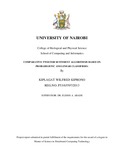Comparative Tweeter Sentiment Algorithms Based on Probabilistic and Linear Classifiers
| dc.contributor.author | Kiplagat, Wilfred K | |
| dc.date.accessioned | 2016-11-28T06:38:37Z | |
| dc.date.available | 2016-11-28T06:38:37Z | |
| dc.date.issued | 2016 | |
| dc.identifier.uri | http://hdl.handle.net/11295/97892 | |
| dc.description.abstract | The transition from web 1.0 to web 2.0 has enabled direct interaction between users and its environment such as social media networks. In this research paper we have analyzed algorithms for sentiment analysis which can be used to utilize this huge information. The goals of this research is to device a way of obtaining social network opinions, extracting features from unstructured text and assign for each feature its associated sentiment in a clear and efficient way. In this project we have applied naïve bayes, support vector machines and maximum entropy for analysis and produced an analytical report of the three qualitatively and quantitatively. We performed the project empirically and analyzed the resulting data using an excel tool so as to obtain comparative analysis of the three algorithms for classification. | en_US |
| dc.language.iso | en_US | en_US |
| dc.publisher | University of Nairobi | en_US |
| dc.rights | Attribution-NonCommercial-NoDerivs 3.0 United States | * |
| dc.rights.uri | http://creativecommons.org/licenses/by-nc-nd/3.0/us/ | * |
| dc.title | Comparative Tweeter Sentiment Algorithms Based on Probabilistic and Linear Classifiers | en_US |
| dc.type | Thesis | en_US |



